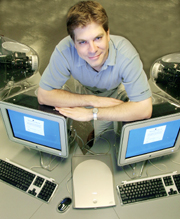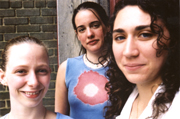
 |

|
|
 |
|
|
|||
|
|
|
|
|
 Paul Cholmsky photo by Andrew Dobrowolskyj |
Paul Cholmsky: Rising star in educational technology Master’s student Paul Cholmksy bridges the gap between teaching and technology. “It’s easy to find a programmer and it’s easy to find a pedagogue, but it’s rare to find both,” said the 30-year-old consultant and software designer, who is getting his Master’s degree in Educational Technology. Cholmsky has been designing educational software since he graduated from Concordia’s Communication Studies program in the mid-1990s. He helped create OhmZone and PowerHouse, virtual labs that encourage hands-on-learning for high school students. OhmZone helps students build their own electrical circuit and visualize the speed and direction of the current. PowerHouse helps students understand the contribution of each household appliance to the electricity bill by letting them vary the operating times of each machine. Cholmsky believes that this sort of hands-on learning improves students’ understanding of abstract concepts like current and voltage. “For some people, physical manipulations are important, because it’s easier for them to visualize things than to struggle with text. We can do that digitally,” he said. The Quebec Ministry of Education seemed to agree, and distributed the program to all high schools across the province. Cholmsky and his former business partner, Robert Gordon, also designed Pillaged Lives, a CD-ROM that gives an overview of the debt problem in the developing world. Still, not long after finishing his undergraduate degree at Concordia, he realized that one of the country’s top educational technology programs lay right in his backyard. “When I came out of communications studies, I had not yet found my home,” he said. “Educational technology was the perfect fit.” Although Concordia’s Educational Technology program is about 30 years old, the field has recently become hotter than ever. “The opportunities for people who bridge the pedagogical and the technological are vast,” Cholmsky said. “Where we are, in education, there’s an incredible amount of good work to be done.” —Sigalit Hoffman |
||
 Science College graduates Laura Weir, Kimberly Bull and Ruba Benini Photo by Vincenzo D'Alto |
Science College grads out to improve the world Three top graduates of Concordia’s Science College agree that they’re starting their careers with an edge. Ruba Benini, Biochemistry Co-op student , described the research projects that students carry out as “a very big advantage.” The 22-year-old is researching epilepsy at the Montreal Neurological Institute and will start the MD-PhD program McGill University next August. Fellow Biochemistry Co-op student Kimberly Bull agreed. “It has been an exciting experience, being able to really do research, to have practical experience, and to benefit from having the other students around,” she said. Bull and Benini were among the first students to belong to both the Science College and the Biochemistry Co-op program. Since each program requires at least three research projects in addition to the regular course load, professors feared the joint program would be overwhelming—but the girls proved that they were able to excel in every area. For Bull, the opportunity translated into a term at a French pharmaceutical company, which sent her to Italy on brief research stints. “I lived in Paris and worked full time doing research,” she said. “It was one of those rare opportunities to do something unique.” Science College grad Laura Weir is also grateful for the opportunities the program provided her. After completing a research project in molecular biology for the College, the Ecology student decided to combine the two fields for her Master’s thesis at Dalhousie University. “A lot of the time, people become specialized in one area or the other. It’s nice to be able to join the two, and to step back and say they are really not that different,” she said. Weir received a grant from the Natural Sciences and Engineering Research Council of more than $17,000 a year for the length of her graduate studies. She plans to study the conservation of Atlantic salmon. Like Weir, Benini’s choice to pursue both medicine and research allowed her to combine two of her passions. “I love science and I love research, but I also like working with people. The MD-PhD program combines everything I am looking for.” Besides support from strong academics, the College gives its members access to the College’s Mackay St. annex, where they can study together and meet with College fellows. “It has helped me a lot,” Benini said. “I have met a lot of interesting people and the environment is very friendly.” Bull agreed. “It gives you a chance to spend time with people outside the school.” These graduates are determined to use their skills to improve the world. “I’m going in the conservation direction,” Weir said. “It’s important, given the state of the world these days.” Congratulations also to Grigoria Mavrogeorgis, a student in Honours Biochemistry at the Science College, who will give the valedictory address to the morning Arts and Science convocation on June 13. —SH |